| Listing 1 - 10 of 19 | << page >> |
Sort by
|
Book
ISBN: 1280832827 9786610832828 1597452955 Year: 2007 Publisher: Totowa, NJ : Humana Press : Imprint: Humana,
Abstract | Keywords | Export | Availability | Bookmark
 Loading...
Loading...Choose an application
- Reference Manager
- EndNote
- RefWorks (Direct export to RefWorks)
The idea for Bioethics in Law began more than a decade ago, while I was studying social science and law. I was parti- larly interested in the collaborations that comprised social s- ence in law. Economic and social data in the pioneering Brandeis brief had been used to defend an early 20th-century labor law; surveys of consumer confusion had helped resolve trademark - fringement cases; psychologists’ predictions of future violence had informed capital sentencing decisions. Additionally, Kenneth Clark’s “doll studies,” cited by the Supreme Court in Brown v. Board of Education, had helped change the course of American 1 history. During that time, however, I was most intensely interested in bioethics, a relatively young field whose relationships to law had not been well analyzed. I wondered whether there could or should be a bioethics in law, because bioethics, unlike the social sciences, was not only in its infancy, but also had distinctly normative features, which might not mesh easily with law’s own normativity.
Medical laws and legislation --- Judicial process --- Medical jurisprudence --- Bioethics --- Medical ethics. --- Theory of Medicine/Bioethics. --- Biomedical ethics --- Clinical ethics --- Ethics, Medical --- Health care ethics --- Medical care --- Medicine --- Professional ethics --- Nursing ethics --- Social medicine --- Moral and ethical aspects
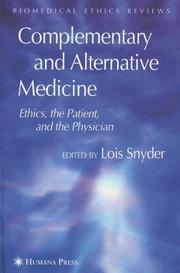
ISBN: 128083286X 9786610832866 1597453811 1588295842 Year: 2007 Publisher: Totowa, N.J. : Humana Press,
Abstract | Keywords | Export | Availability | Bookmark
 Loading...
Loading...Choose an application
- Reference Manager
- EndNote
- RefWorks (Direct export to RefWorks)
Complementary and Alternative Medicine examines the real-life implications of patient issues and the healthcare system in which care is delivered. Because complementary and alternative medicine (CAM) are not presently considered to be a part of conventional medicine, this book discusses the effect that CAM has on patients, physicians, healthcare, and policymakers. Also included are the implications that CAM has on traditional patient-physician relationships as well as the physician's ethical obligations on this subject.
Medical ethics. --- Physician and patient --- Moral and ethical aspects. --- Doctor and patient --- Doctor-patient relationships --- Patient and doctor --- Patient and physician --- Patient-doctor relationships --- Patient-physician relationships --- Patients and doctors --- Patients and physicians --- Physician-patient relationships --- Physicians and patients --- Interpersonal relations --- Fear of doctors --- Narrative medicine --- Biomedical ethics --- Clinical ethics --- Ethics, Medical --- Health care ethics --- Medical care --- Medicine --- Bioethics --- Professional ethics --- Nursing ethics --- Social medicine --- Moral and ethical aspects
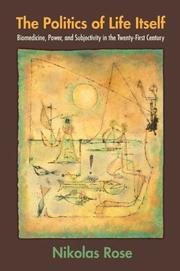
ISBN: 9780691121901 9780691121918 0691121915 0691121907 9786612458293 1400827507 1282458299 9781400827503 9781282458291 6612458291 Year: 2007 Publisher: Princeton/Oxford Princeton University Press
Abstract | Keywords | Export | Availability | Bookmark
 Loading...
Loading...Choose an application
- Reference Manager
- EndNote
- RefWorks (Direct export to RefWorks)
For centuries, medicine aimed to treat abnormalities. But today normality itself is open to medical modification. Equipped with a new molecular understanding of bodies and minds, and new techniques for manipulating basic life processes at the level of molecules, cells, and genes, medicine now seeks to manage human vital processes. The Politics of Life Itself offers a much-needed examination of recent developments in the life sciences and biomedicine that have led to the widespread politicization of medicine, human life, and biotechnology.Avoiding the hype of popular science and the pessimism of most social science, Nikolas Rose analyzes contemporary molecular biopolitics, examining developments in genomics, neuroscience, pharmacology, and psychopharmacology and the ways they have affected racial politics, crime control, and psychiatry. Rose analyzes the transformation of biomedicine from the practice of healing to the government of life; the new emphasis on treating disease susceptibilities rather than disease; the shift in our understanding of the patient; the emergence of new forms of medical activism; the rise of biocapital; and the mutations in biopower. He concludes that these developments have profound consequences for who we think we are, and who we want to be.
Sociology of knowledge --- Professional ethics. Deontology --- Human medicine --- Bioethics --- Medical innovations --- Bioéthique --- Medecine --- Social aspects --- Innovations --- Aspect social --- #SBIB:316.334.3M40 --- #SBIB:316.7C122 --- #SBIB:39A9 --- Medische sociologie: zorgenverstrekkers, relatie met hulpvragers --- Cultuursociologie: overtuigingen, waarden en houdingen --- Medische antropologie / gezondheid / handicaps --- Erfelijkheidsleer --- Fysiologie --- Psychofarmaca --- Geneesmiddelen --- Bioethics. --- Bioéthique. --- Médecine --- Bioethical Issues. --- Biotechnology --- Ethische aspecten. --- Genomica. --- Politieke aspecten. --- Social aspects. --- Aspect social. --- ethics. --- Bioéthique. --- Médecine --- Ethics. --- Bioéthique --- Society and medical innovations --- Biology --- Biomedical ethics --- Life sciences --- Life sciences ethics --- Moral and ethical aspects --- Bioethique. --- Science --- Bioethical Issue --- Issue, Bioethical --- Issues, Bioethical --- Euthanasia --- Human Experimentation --- Patient Rights --- Animal Experimentation --- Chemical engineering --- Genetic engineering --- Psychofarmacon --- Geneesmiddel --- Droit médical
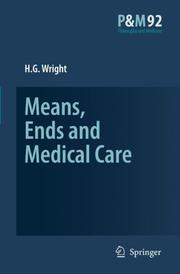
ISBN: 128085264X 9786610852642 1402052928 140205291X 9048173329 Year: 2007 Volume: 92 Publisher: Dordrecht : Springer Netherlands : Imprint: Springer,
Abstract | Keywords | Export | Availability | Bookmark
 Loading...
Loading...Choose an application
- Reference Manager
- EndNote
- RefWorks (Direct export to RefWorks)
In this remarkable book, Gary Wright brings his thirty years of experience as a physician in pediatric and family medicine together with his Ph.D. in philosophy to address the important problem of the nature of good medical reasoning. His intimate experiential knowledge of the founding assumptions of managed health care in America today is abundantly evident in his powerful critique of the overly simplistic models of medical judgment that ground most of our health programs. Writing with exceptional clarity, heart-felt compassion for the physical and emotional suffering of patients, and deep philosophical insight into the nature of human cognition, Wright uses the conceptual tools of recent cognitive science to analyze and critique some of the most basic underlying conceptions of contemporary medical care. To make it clear why we desperately need a richer, more nuanced account of medical reasoning, Wright gives a brilliant analysis of the complex internal structure of our concepts of health and disease, showing that our present models are wholly incapable of dealing with the realities of actual human disease. He then shows the error of assuming that we always know in advance what the medical and moral ends are for any medical situation. This leads to a radical questioning of so-called "rational actor" or "economic" models of rationality that are popular in medicine today. However, Wright’s project is not merely critical. More constructively, he draws extensively on empirical research coming out of the cognitive sciences concerning the nature of concepts, reasoning, and judgment, and he then appropriates this research into a broader pragmatist philosophical framework developed by the American philosopher John Dewey. Wright finds in Dewey’s theories of mind, thought, and experience a comprehensive account of human thinking that adequately captures the complexity of actual human conceptualization and reasoning. At the heart of this new view lies an acknowledgment of the central role of imagination and values in all of our thinking. He shows how we actually make sense of our experience by employing cognitive prototypes, metaphorically-defined concepts, radially structured categories, and other processes of imaginative reflection and evaluation. The result of Wright’s alternative view of mind and medical judgment is a practically useful model of medical reasoning that, although not specifiable by a set of fixed rules, can yet give realistic guidance for medical decisions. It is a sensitive model that each of us would want our own physicians to adopt. Prof. Mark Johnson, Department of Philosophy, University of Oregon 'This is one of the best books I have read that addresses Dewey's method of intelligence in the context of practical, including clinical, decision-making. I loved it.' Prof. Griffin Trotter, Center for Health Care Ethics, Saint Louis University, USA .
Medicine --- Medical logic. --- Philosophy. --- Medical logic --- Clinical reasoning --- Logic, Medical --- Medical reasoning --- Diagnosis --- Philosophy --- Medicine-Philosophy. --- Pragmatism. --- Ethics. --- Medical ethics. --- Economic theory. --- Philosophy of Medicine. --- Theory of Medicine/Bioethics. --- Economic Theory/Quantitative Economics/Mathematical Methods. --- Economic theory --- Political economy --- Social sciences --- Economic man --- Biomedical ethics --- Clinical ethics --- Ethics, Medical --- Health care ethics --- Medical care --- Bioethics --- Professional ethics --- Nursing ethics --- Social medicine --- Deontology --- Ethics, Primitive --- Ethology --- Moral philosophy --- Morality --- Morals --- Philosophy, Moral --- Science, Moral --- Values --- Idealism --- Knowledge, Theory of --- Philosophy, Modern --- Positivism --- Realism --- Utilitarianism --- Experience --- Reality --- Truth --- Moral and ethical aspects --- Health Workforce --- Medicine—Philosophy.
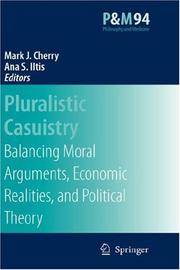
ISBN: 1281044385 9786611044381 1402062605 1402062591 9048175860 Year: 2007 Volume: 94 Publisher: Dordrecht : Springer Netherlands : Imprint: Springer,
Abstract | Keywords | Export | Availability | Bookmark
 Loading...
Loading...Choose an application
- Reference Manager
- EndNote
- RefWorks (Direct export to RefWorks)
Baruch A. Brody has been one of the most important voices in bioethics over the last several decades, asking new and challenging questions about a range of problems, examining recalcitrant issues in novel ways, always with the goal of offering practical solutions to complex problems. This volume presents a sustained philosophical analysis of Brody’s contributions to biomedical ethics. The essays in this volume compass epistemological, methodological, and topical contributions to bioethics, including both application and criticism of Brody’s normative moral theory – pluralistic casuistry – Jewish medical ethics, human embryo transfer, medical futility, life and death decisions in pediatrics, euthanasia and end-of-life decision-making, the obligations of clinical researchers toward study participants, and professional integrity. Done well, philosophical work can clarify complex issues, facilitate creative problem solving, and lead to real-world solutions to difficult situations. Each contributor carefully and critically explores Brody’s writings in biomedical ethics and the philosophy of medicine, illustrating his appreciation that thorough and critical scientific research and philosophical analysis are central to reining in the untutored human desire to ameliorate pain and suffering so that medical treatments and health care policy do more good than harm.
Bioethics. --- Casuistry. --- Medical ethics. --- Medicine --- Religious aspects --- Judaism. --- Philosophy. --- Brody, Baruch A. --- Medical logic --- Biomedical ethics --- Clinical ethics --- Ethics, Medical --- Health care ethics --- Medical care --- Bioethics --- Professional ethics --- Nursing ethics --- Social medicine --- Moral and ethical aspects --- Jews --- Cases of conscience --- Christian ethics --- Ethics --- Scholasticism --- Applied ethics --- Biology --- Life sciences --- Life sciences ethics --- Science --- Brody, Baruch --- Brody, Boruch A. --- Ethics. --- Medicine-Philosophy. --- Philosophy of Medicine. --- Theory of Medicine/Bioethics. --- Deontology --- Ethics, Primitive --- Ethology --- Moral philosophy --- Morality --- Morals --- Philosophy, Moral --- Science, Moral --- Philosophy --- Values --- Health Workforce --- Medicine—Philosophy.
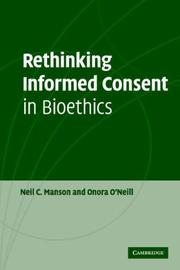
ISBN: 9780521697477 9780521874588 0521697476 0521874580 9780511814600 9780511286247 0511286244 0511285507 9780511285509 0511814607 9780511284700 0511284705 1107172314 1280909463 9786610909469 0511283903 0511321120 Year: 2007 Publisher: Cambridge : Cambridge University Press,
Abstract | Keywords | Export | Availability | Bookmark
 Loading...
Loading...Choose an application
- Reference Manager
- EndNote
- RefWorks (Direct export to RefWorks)
Informed consent is a central topic in contemporary biomedical ethics. Yet attempts to set defensible and feasible standards for consenting have led to persistent difficulties. In Rethinking Informed Consent in Bioethics, first published in 2007, Neil Manson and Onora O'Neill set debates about informed consent in medicine and research in a fresh light. They show why informed consent cannot be fully specific or fully explicit, and why more specific consent is not always ethically better. They argue that consent needs distinctive communicative transactions, by which other obligations, prohibitions, and rights can be waived or set aside in controlled and specific ways. Their book offers a coherent, wide-ranging and practical account of the role of consent in biomedicine which will be valuable to readers working in a range of areas in bioethics, medicine and law.
Informed Consent --- Informed consent (Medical law) --- Bioethics. --- Medicine --- Consentement éclairé (Droit médical) --- Bioéthique --- Médecine --- ethics. --- Research --- Moral and ethical aspects. --- Recherche --- Aspect moral --- Bioethics --- Moral and ethical aspects --- Informed consent (Medical law). --- Consentement éclairé (Droit médical) --- Bioéthique --- Médecine --- Health Workforce --- Consent, Informed --- Consent to treatment --- Disclosure, Medical --- Medical disclosure --- Treatment, Consent to --- Consent (Law) --- Medical ethics --- Medical personnel --- Patient education --- Involuntary treatment --- Patient refusal of treatment --- Biology --- Biomedical ethics --- Life sciences --- Life sciences ethics --- Science --- Research&delete& --- Malpractice --- Arts and Humanities --- Philosophy --- Medicine - Research - Moral and ethical aspects --- Droit médical
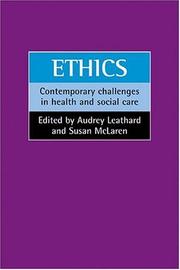
ISBN: 1447302214 1281741590 9786611741594 1847422284 1861347561 1861347553 Year: 2007 Publisher: Bristol, UK : Policy Press,
Abstract | Keywords | Export | Availability | Bookmark
 Loading...
Loading...Choose an application
- Reference Manager
- EndNote
- RefWorks (Direct export to RefWorks)
While ethics has been addressed in the health care literature, relatively little attention has been paid to the subject in the field of social care. This book redresses the balance by examining theory, research, policy and practice in both fields. The importance of this approach is reflected in the growing emphasis on ethical issues in research and practice and, in Britain, on government policy aimed at improving partnership working across the two sectors. The analysis is set within the context of contemporary challenges facing health and social care, not only in Britain but internationally. Contributors from the UK, US and Australia consider: ethical issues in health and social care research and governance; interprofessional and user perspectives; ethics in relation to human rights, the law, finance, management and provision; key issues of relevance to vulnerable groups, such as children and young people, those with complex disabilities, older people and those with mental health problems; and lifecourse issues - ethical perspectives on a range of challenging areas from new technologies of reproduction to euthanasia. This book is intended for academics, students and researchers in health and social care who need an up-to-date analysis of contemporary issues and debates. It will also be useful to practitioners in the public, private and voluntary sectors, including social workers, community workers, those working in the fields of disability and mental health and with older people.
Social medicine --- Medical ethics --- Law and ethics --- Medical --- Medical Care. --- Medical Ethics. --- Law and ethics. --- Social medicine. --- Medical ethics. --- Health Care Delivery. --- Ethics. --- Medical care --- Medical sociology --- Medicine --- Medicine, Social --- Public health --- Public welfare --- Sociology --- Medical sociologists --- Biomedical ethics --- Clinical ethics --- Ethics, Medical --- Health care ethics --- Bioethics --- Professional ethics --- Nursing ethics --- Ethics and law --- Law and morals --- Morals and law --- Law --- Delivery of health care --- Delivery of medical care --- Health care --- Health care delivery --- Health services --- Healthcare --- Medical and health care industry --- Medical services --- Personal health services --- Social aspects --- Moral and ethical aspects --- Philosophy
Book
ISBN: 038771362X Year: 2007 Publisher: New York, NY : Springer US : Imprint: Springer,
Abstract | Keywords | Export | Availability | Bookmark
 Loading...
Loading...Choose an application
- Reference Manager
- EndNote
- RefWorks (Direct export to RefWorks)
Researchers into HIV/AIDS face a gamut of ethical as well as scientific challenges. By viewing the gathering of data as a reciprocal activity between researchers, participants, and their communities, the expert contributors to Case Studies in Ethics and HIV Research bring these challenges to the fore. Studies from the United States and abroad depict the ongoing balance of risks and benefits while analyzing issues that range from confidentiality and informed consent to conducting studies with minority and other marginalized populations, from dealing with government and other funding agencies to ownership of findings. The book’s 25 collaborators offer readers new templates for devising and conducting studies that are valid, meaningful, and morally sound, with critical implications for all research involving human subjects. Twelve case studies illuminate key ethical issues in HIV research and real-world approaches to addressing them, including: Recruiting and selecting study participants. Providing proper standards of care to control groups. Improving researcher safety in the field. Special issues in conducting research: activity-identified populations (e.g., IV drug users), children, cognitively-impaired persons, multiple sites. Community outreach in service evaluation. Training the new generation of researchers. Improved study design and methodology, and improved outcomes for participants are important steps on the way to preventing and stopping the spread of AIDS. For professionals in public health research, the collective knowledge of Case Studies in Ethics and HIV Research will help to map out the road ahead.
HIV infections --- Research --- Moral and ethical aspects. --- Moral and ethical aspects --- Methodology --- Research. --- Methodology. --- HIV (Viruses) infections --- HTLV-III infections --- HTLV-III-LAV infections --- Human T-lymphotropic virus III infections --- Lentivirus infections --- Sexually transmitted diseases --- Medical ethics. --- Medicine. --- Epidemiology. --- Theory of Medicine/Bioethics. --- Public Health. --- Health Promotion and Disease Prevention. --- Diseases --- Public health --- Clinical sciences --- Medical profession --- Human biology --- Life sciences --- Medical sciences --- Pathology --- Physicians --- Biomedical ethics --- Clinical ethics --- Ethics, Medical --- Health care ethics --- Medical care --- Medicine --- Bioethics --- Professional ethics --- Nursing ethics --- Social medicine --- Health Workforce --- Public health. --- Health promotion. --- Health promotion programs --- Health promotion services --- Promotion of health --- Wellness programs --- Preventive health services --- Health education --- Community health --- Health services --- Hygiene, Public --- Hygiene, Social --- Public health services --- Public hygiene --- Social hygiene --- Health --- Human services --- Biosecurity --- Health literacy --- Medicine, Preventive --- National health services --- Sanitation
Book
ISBN: 1280805064 9786610805068 1402052146 Year: 2007 Volume: v. 33 Publisher: Dordrecht : Springer Netherlands : Imprint: Springer,
Abstract | Keywords | Export | Availability | Bookmark
 Loading...
Loading...Choose an application
- Reference Manager
- EndNote
- RefWorks (Direct export to RefWorks)
What does just health care imply? Does it mean that people have a right to health care? Does it entail that there are rights-based social obligations to provide equal access to health care for everyone? And if so, why? Why are health care interests so important that they deserve special protection? What kind of social good is health care? What are its functions and do these make it different from other commodities? Furthermore, how much equality should there be in health care? What inequalities are morally acceptable and how should the burdens of achieving equality be distributed? Which matters of health care belong to the domain of justice, and which to the domain of charity? To what extent should we allow personal responsibility to play a role in allocating health care services and resources, or in distributing the costs? And what does justice require with regard to long-term care for the chronically ill and irreversibly dependent? Since the 90’s, issues of scarcity, priority setting, and rationing lie at the centre of most current debates on health care. These are pressing issues: one way or another, limits have to be set. As such, the question of what is involved in just health care becomes much more complex. This complexity can be represented as an inconsistent triad, a set of three propositions of which any two are compatible but which together form a contradiction. In the case of health care, the three rival values are: social efficiency, justice, and decent-quality care. It seems to be that we can have any two but not all three. Essentially, the central question is the following: how best to square the proverbial welfare circle. How can resources be matched to needs, or needs to resources in socially acceptable and economically feasible ways? This book attempts to answer the question how health care can be incorporated into a comprehensive theory of justice, while realising an acceptable balance between efficiency, justice and care. ‘…I find it (the book) to be uncommonly good. The author very carefully analyzes key philosophical positions as they have been applied in this area; the research is very thorough, the writing is clear and engaging. This book could well be used in just about any university course dealing with public health care.’ Professor David Novak, University of Toronto, Canada ‘One of the most interesting books I have read in a long time…a very extensive overview of some prominent modern theories of justice and their application to resource distribution in health care. Based on this it raises a number of new and original questions, some of which also receive original and convincing answers.’ Professor Søren Holm, Cardiff Law School, United Kingdom.
Public health --- Health services accessibility. --- Discrimination in medical care. --- Social justice. --- Moral and ethical aspects. --- Equality --- Justice --- Race discrimination in medical care --- Medical care --- Access to health care --- Accessibility of health services --- Availability of health services --- Access --- Philosophy (General). --- Ethics. --- Medicine. --- Medicine-Philosophy. --- Medical ethics. --- Philosophy, general. --- Medicine/Public Health, general. --- Public Health. --- Philosophy of Medicine. --- Theory of Medicine/Bioethics. --- Medicine --- Philosophy. --- Medical logic --- Deontology --- Ethics, Primitive --- Ethology --- Moral philosophy --- Morality --- Morals --- Philosophy, Moral --- Science, Moral --- Philosophy --- Values --- Biomedical ethics --- Clinical ethics --- Ethics, Medical --- Health care ethics --- Bioethics --- Professional ethics --- Nursing ethics --- Social medicine --- Clinical sciences --- Medical profession --- Human biology --- Life sciences --- Medical sciences --- Pathology --- Physicians --- Moral and ethical aspects --- Health Workforce --- Public health. --- Medicine—Philosophy. --- Community health --- Health services --- Hygiene, Public --- Hygiene, Social --- Public health services --- Public hygiene --- Social hygiene --- Health --- Human services --- Biosecurity --- Health literacy --- Medicine, Preventive --- National health services --- Sanitation --- Mental philosophy --- Humanities
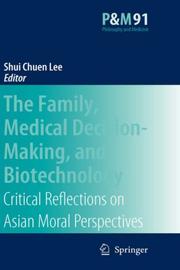
ISBN: 1280864109 9786610864102 1402052200 1402052197 9400788487 Year: 2007 Volume: 91 Publisher: Dordrecht : Springer Netherlands : Imprint: Springer,
Abstract | Keywords | Export | Availability | Bookmark
 Loading...
Loading...Choose an application
- Reference Manager
- EndNote
- RefWorks (Direct export to RefWorks)
East Asian medicine, biomedical research, and health care policy are framed by their own set of moral and cultural commitments. Chief among these is the influence of Confucian ideas. A rich portrayal is offered of the implications of Confucian moral and ontological understandings for medical decision-making, human embryonic stem cell research, and health care financing. What is offered is a multifaceted insight into what distinguishes East Asian bioethical reflections. This volume opens with an exploration of the Confucian recognition of the family as an entity existing in its own right and which is not reducible to its members or their interests. As the essays in this volume show, this recognition of the family supports a notion of family autonomy that contrasts with Western individualistic accounts of proper medical decision-making. There are analyses of basic concepts as well as explorations of their implications for actual medical practice. The conflicts in East Asian countries between traditional Confucian and Western bioethics are explored as well as the tension between the new reproductive technologies and traditional understandings of the family. The studies of East Asian reflections concerning the moral status of human embryos and the morality of human embryo stem cell research disclose a set of concerns quite different from those anchored in Christian and Muslim cultural perspectives. The volume closes with an exploration of how Confucian cultural resources can be drawn upon to meet the contemporary challenges of health care financing.
Medical ethics --- Bioethics --- Families --- Biotechnology --- Genetic engineering --- Cross-cultural studies --- Moral and ethical aspects. --- Family --- Family life --- Family relationships --- Family structure --- Relationships, Family --- Structure, Family --- Social institutions --- Birth order --- Domestic relations --- Home --- Households --- Kinship --- Marriage --- Matriarchy --- Parenthood --- Patriarchy --- Biology --- Biomedical ethics --- Life sciences --- Life sciences ethics --- Science --- Clinical ethics --- Ethics, Medical --- Health care ethics --- Medical care --- Medicine --- Professional ethics --- Nursing ethics --- Social medicine --- Social aspects --- Social conditions --- Moral and ethical aspects --- Medicine. --- Biotechnology. --- Medicine-Philosophy. --- Ethics. --- Biomedicine general. --- Sociology of Family, Youth and Aging. --- Philosophy of Medicine. --- Medicine/Public Health, general. --- Clinical sciences --- Medical profession --- Human biology --- Medical sciences --- Pathology --- Physicians --- Deontology --- Ethics, Primitive --- Ethology --- Moral philosophy --- Morality --- Morals --- Philosophy, Moral --- Science, Moral --- Philosophy --- Values --- Chemical engineering --- Health Workforce --- Social groups. --- Family. --- Medicine—Philosophy. --- Biomedicine, general. --- Association --- Group dynamics --- Groups, Social --- Associations, institutions, etc. --- Social participation
| Listing 1 - 10 of 19 | << page >> |
Sort by
|

 Search
Search Feedback
Feedback About
About Help
Help News
News